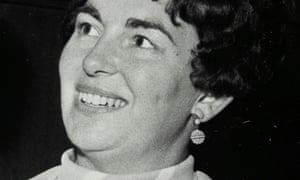
My mother, Mary Tisdall, who has died aged 84, was a groundbreaking newspaper columnist and BBC radio journalist who focused on the lives of ordinary women who, like her, came from modest backgrounds and whose aspirations and concerns she felt were often ignored.
Born in Redcliffe, Bristol, she was the daughter of Doris (nee Williams, and known as Dodo), who worked part-time as a barmaid, and Charles Pritchard, a bookmaker. Mary won a place at Merrywood grammar school for girls, where she showed great promise. Her studies were cut short when her father insisted she go out to work.
In 1949 Mary joined the typing pool of the Bristol Evening World, working her way up to junior reporter. While there, she met John Tisdall, whom she married, aged 19, at St Mary Redcliffe, Bristol, in 1951. Her career was placed on hold by my birth, and that of her daughter, Sarah, and a second son, Nicholas. Nicky was born with severe disabilities. He died in 1988.
Mary’s upbringing as the only child of a racecourse bookie in a tough, working-class area of Bristol, and her testing experiences as a mother, deeply influenced her journalism. Between 1962 and 1966, now based in Newcastle upon Tyne, she began work as a freelance for the BBC, Tyne Tees Television and the Northern Echo.
She developed a highly productive relationship with Harry Evans, the Northern Echo’s editor who went on to edit the Sunday Times. Evans later told me he found in her a bold and independent voice for women. He gave Mary a weekly column in the news pages, an innovation for the time. Writing under the pen-name Mary Redcliffe, she bravely tackled many taboo subjects. She wrote about the pill and making contraception available to young women, sex education in school (then largely non-existent), divorce (almost unobtainable), NHS treatment of expectant mothers (poor) and discrimination against women (ubiquitous).
Mary once visited a men-only bar in Newcastle and talked to the clientele as they threw her out. Then, by prior arrangement with the pub’s landlord, she returned the following day as a barmaid and re-interviewed the drinkers about double standards.
In 1964, she broadcast a pioneering piece about a woman who had undergone an illegal backstreet abortion. The anonymous woman’s story, harrowing and shocking, helped spur national debate leading to a change in the law. The interview was re-broadcast by BBC Radio 4’s Woman’s Hour in January to mark the 50th anniversary of the 1967 Abortion Act.
Mary also worked for the Sheffield Morning Telegraph and Radio Sheffield, and as a Woman’s Hour reporter and staff producer in London from 1969 onwards. She continued to focus on ordinary lives, as in her innovative Woman’s Hour series, Diary of a Pregnancy and Diary of an Engagement.
She maintained a strong interest in family issues, and volunteered in retirement for her local Home Start charity in Herefordshire.
She was passionate about theatre, musicals and Hollywood. She joked that her contemporary, Elizabeth Taylor, whom she resembled, was fortunate to be evacuated to Los Angeles in 1939, while Mary was sent to Cardiff, where openings for movie goddesses were fewer.
Mary was always her own leading lady, caring, intelligent and formidable. John died in 2007. She is survived by me, Sarah, and her granddaughters, Laura, Polly and Grace.